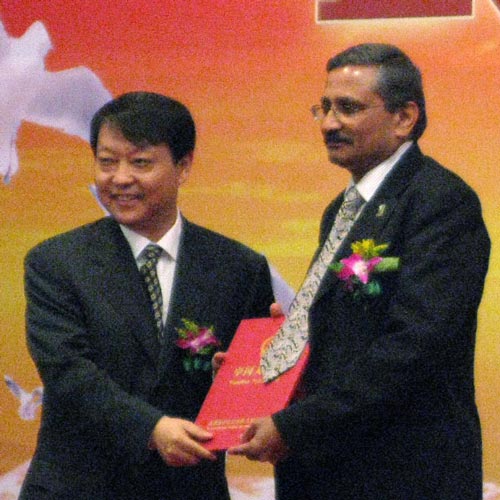 Ravi Singh, distinguished scientist and head of Bread Wheat Improvement and Rust Research, Global Wheat Program, received the 2012 China Tianshan Award for his contributions to the economic and social progress of the Xinjiang Uygur Autonomous Region of China. The highest award given to foreign experts by the Government of Xinjiang Province was presented by Huang Wei, Executive Vice- Governor of the Province, on 27 September 2012 during a ceremony at Urumqi attended by over 150 officials and guests.
Ravi Singh, distinguished scientist and head of Bread Wheat Improvement and Rust Research, Global Wheat Program, received the 2012 China Tianshan Award for his contributions to the economic and social progress of the Xinjiang Uygur Autonomous Region of China. The highest award given to foreign experts by the Government of Xinjiang Province was presented by Huang Wei, Executive Vice- Governor of the Province, on 27 September 2012 during a ceremony at Urumqi attended by over 150 officials and guests.
Singh is the second CIMMYT scientist to have received the award. Sanjaya Rajaram, former CIMMYT wheat director, received the Tianshan Award in 2005. This is a reflection of the significant contributions to wheat production in the province achieved through the use of CIMMYT germplasm. More than 20 CIMMYT-derived spring wheat varieties have been released in the province directly after introduction or by being used as parents since the 1970s. The main breeding priorities for the new varieties are increased yield potential with early maturity, short stature, rust resistance, and good end-use quality. The wheat production area covers about one million hectares in the province, 40 % of which is used for spring wheat. Spring wheat is sown in March, which enables drip irrigation systems to be used widely to mitigate the negative effects of limited water resources, as water becomes available from the melting snow in the mountains. The most recent CIMMYT-derived variety is Kambara, known as “Xinchun 23” in China (released in northwestern Mexico as “Tacupeto F2001”). High yielding, early-maturing wheat lines developed in recent years in Mexico and shared with two academies in the province offer further possibilities of increasing yield as they fit into the crop rotation.
 Nutrition, health and food security
Nutrition, health and food security